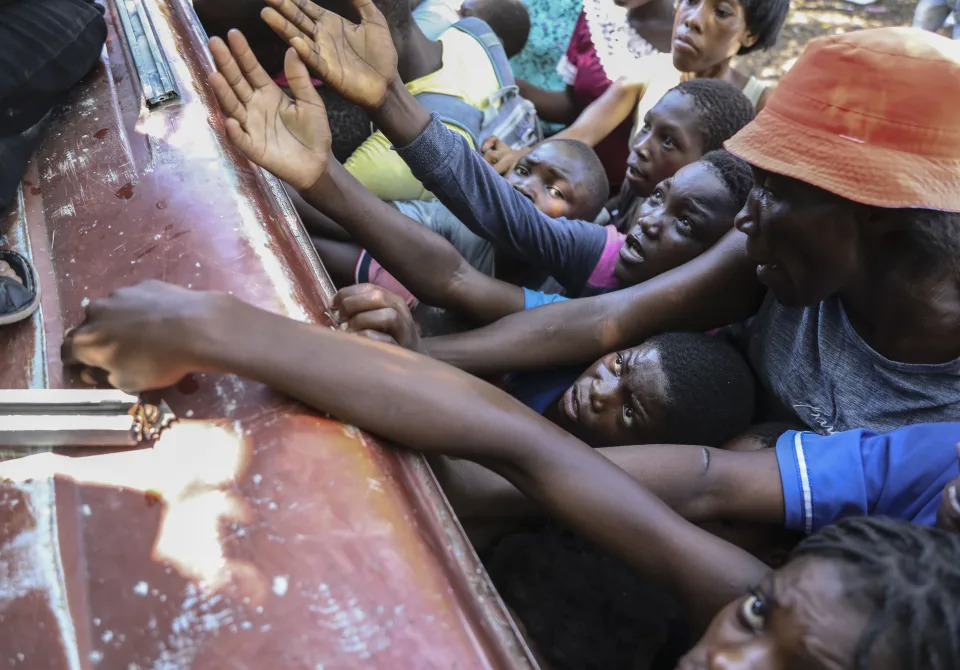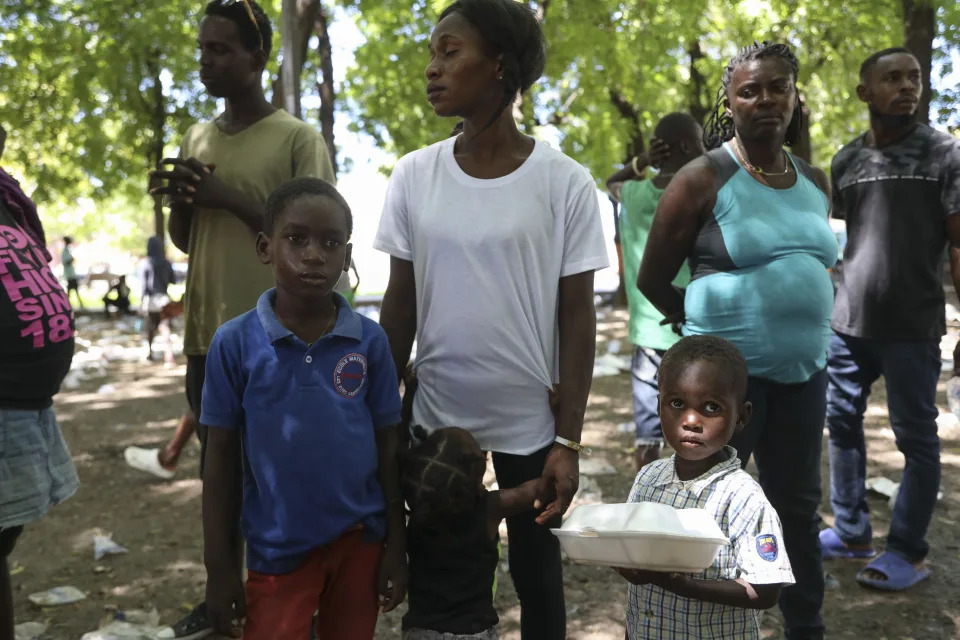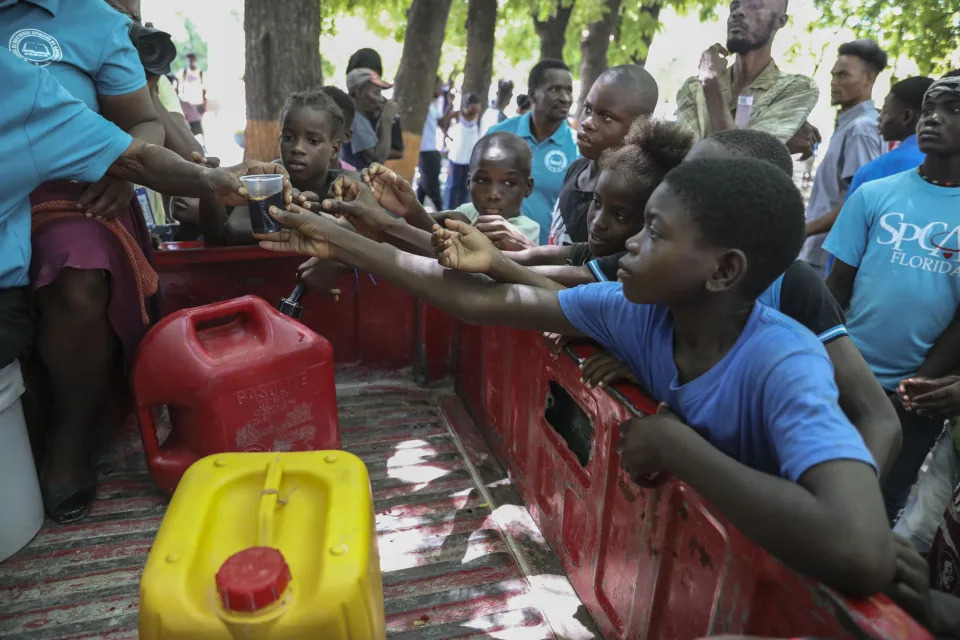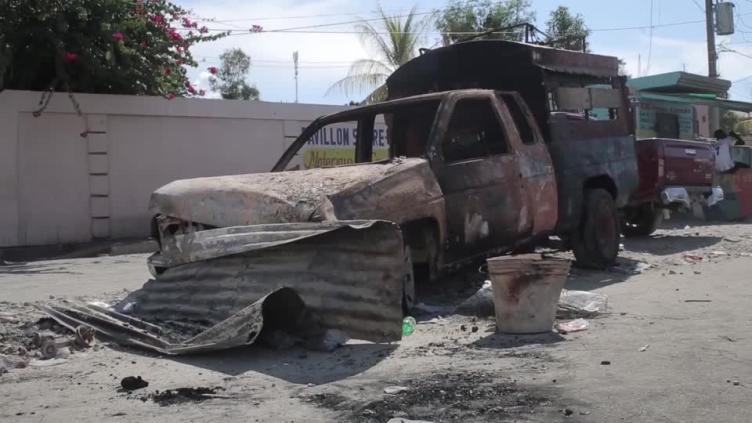Over 6,000 people in Haiti leave their homes after gang attack killed dozens
PIERRE-RICHARD LUXAMA and ELÉONORE HUGHES
Sun 6 October 2024



Haiti Displacement
People displaced by armed attacks receive food from a nongovernmental organization in Saint-Marc, Haiti, Sunday, Oct. 6, 2024. (AP Photo/Odelyn Joseph)
SAINT-MARC, Haiti (AP) — Nearly 6,300 people have fled their homes in the aftermath of an attack in central Haiti by heavily armed gang members that killed at least 70 people, according to the U.N.’s migration agency.
Nearly 90% of the displaced are staying with relatives in host families, while 12% have found refuge in other sites including a school, the International Organization for Migration said in a report last week.
The attack in Pont-Sondé happened in the early hours of Thursday morning, and many left in the middle of the night.
Gang members “came in shooting and breaking into the houses to steal and burn. I just had time to grab my children and run in the dark,” said 60-year-old Sonise Mirano on Sunday, who was camping with hundreds of people in a park in the nearby coastal city of Saint-Marc.
Bodies lay strewn on the streets of Pont-Sondé following the attack in the Artibonite region, many of them killed by a shot to the head, Bertide Harace, spokeswoman for the Commission for Dialogue, Reconciliation and Awareness to Save the Artibonite, told Magik 9 radio station on Friday.
Initial estimates put the number of those killed at 20 people, but activists and government officials discovered more bodies as they accessed areas of the town. Among the victims was a young mother, her newborn baby and a midwife, Herace said.
Prime Minister Garry Conille vowed that the perpetrators would face the full force of the law in comments in Saint-Marc on Friday.
“It is necessary to arrest them, bring them to justice, and put them in prison. They need to pay for what they have done, and the victims need to receive restitution,” he said.
The U.N. Human Rights Office of the Commissioner said in a statement that it was “horrified by Thursday’s gang attacks.”
The European Union also condemned the violence in a statement on Friday, which it said marked “yet another escalation in the extreme violence these criminal groups are inflicting on the Haitian people.”
Haiti’s government deployed an elite police unit based in the capital of Port-au-Prince to Pont-Sondé following the attack and sent medical supplies to help the area’s lone, and overwhelmed, hospital.
Police will remain in the area for as long as it takes to guarantee safety, Conille said, adding that he didn’t know whether it would take a day or a month. He also appealed to the population, saying “the police cannot do it alone.”
Gang violence across Artibonite, which produces much of Haiti’s food, has increased in recent years. Since that uptick, Thursday’s attack is one of the biggest massacres.
Similar ones have taken place in the capital of Port-au-Prince, 80% of which is controlled by gangs, and they typically are linked to turf wars, with gang members targeting civilians in areas controlled by rivals. Many neighborhoods are not safe, and people affected by the violence have not been able to return home, even if their houses have not been destroyed.
More than 700,000 people — more than half of whom are children — are now internally displaced across Haiti, according to the International Organization for Migration in an Oct. 2 statement. That was an increase of 22% since June.
Port-au-Prince hosts a quarter of the country’s displaced, often residing in overcrowded sites, with little to no access to basic services, the agency said.
Those forced to flee their homes are mostly being accommodated by families, who have reported significant difficulties, including food shortages, overwhelmed healthcare facilities, and a lack of essential supplies on local markets, according to the agency.
___
Hughes reported from Rio de Janeiro.
Haiti PM goes abroad for security support after gang massacre
HE FLED
Updated Sun 6 October 2024

STORY: :: Port-au-Prince, Haiti
Haitian Prime Minister Garry Conille embarked on a trip to the United Arab Emirates and Kenya this weekend to seek security assistance, in the aftermath of one of the deadliest gang attacks the country has seen in recent years.
Gran Grif gang members stormed through the western Artibonite town of Pont-Sonde on Thursday, killing at least 70 people, including children, and forcing over 6,000 residents to flee.
:: Saint-Marc, Haiti
Before his trip, Conille visited attack victims at a nearby hospital, where he said his government would allocate resources to bolster security in Pont-Sonde.
The massacre caused widespread shock in a country that has grown accustomed to outbreaks of violence with little police presence.
"The gangs control the area, they destroyed it," says local resident Roseline. "They shoot so many people, it hurt us a lot.”
While in the UAE, Conille said he will discuss with his counterpart on how to find regular flows of police to help Haiti's national police combat security.
He will then depart the UAE for Nairobi, Kenya.
:: October 5, 2024
“One of the aims of this trip is to go to Kenya to talk to President (William) Ruto about speeding up the deployment of Kenyan troops as quickly as possible to continue supporting the national police force.”
:: September 30, 2024
Last week, the U.N. Security Council authorized another year of international security force to help Haitian police fight gangs.
The mission has so far made little progress.
Promised international support still lags and nearby nations have deported migrants back home.
Only about 400 – mostly Kenyan – police officers are on the ground.
Thursday’s attack is the latest sign of a worsening conflict in Haiti, where armed gangs control most of Port-au-Prince and are expanding to nearby regions.
'They're all dead': Haitians mourn loved ones after massacre
Updated Mon 7 October 2024
STORY: These isplaced Haitians are awaiting food handouts after being driven from their homes by gang violence.
Members of the Gran Grif gang stormed through their town of Pont-Sonde last week, killing at least 70 people and forcing over 6,000 residents to flee with few belongings.
Many of them came to the nearby city of Saint-Marc.
“I lost many many relatives,” says this woman displaced by the gang attack. “Nieces, cousins, aunts, uncles, they’re all dead. They were buried without a funeral.”
The massacre on Thursday was one of the deadliest gang attacks the Caribbean nation has seen in recent years.
The Saint Nicolas Hospital in Saint-Marc treated some of the victims.
One of them is Tcharlith Charles, who says he narrowly escaped death.
"As the gang member approached me, he didn’t point the barrel at me, the gun was facing the ground. I believe in God, I prayed as he tried to fire, it didn’t work."
Gran Grif gang leader Luckson Elan took responsibility for the massacre, saying it was in retaliation for civilians remaining passive while police and vigilante groups killed his soldiers.
Haitian gangs outgun and outnumber the national police force.
And they’ve grown in power as the government has weakened.
Promised international support still lags and nearby nations have deported migrants back to the country.
On Monday, the head of a rotating presidency that is running the country said he would not ratify the handover to the man in line to take over from him, citing unresolved corruption accusations against three other council members.
The break creates fresh uncertainty in the aftermath of the massacre.
The council was formed to replace the government of former Prime Minister Ariel Henry, who was forced to step down amid gang conflicts that have killed thousands and forced over 700,000 people from their homes
UN extends Kenyan policing mission in Haiti in futile attempt to tackle gangs
Amalendu Misra, Professor of International Politics, Lancaster University
Tue 8 October 2024
Haiti is being choked to death by its 200 or so violent criminal gangs. The latest figures to be released by the UN suggest that more than 3,600 people have been killed in the country since January, including over 100 children, while more than 500,000 Haitians have been displaced.
The situation prompted the country’s unelected prime minister, Ariel Henry, to resign in April. And, two months later, a Kenyan-led policing mission tasked with establishing order was deployed to the Caribbean nation. But the operation has so far struggled to rein in the gangs.
So, the UN security council unanimously adopted a resolution on September 30 to extend the mandate of the mission for another year. There was consensus that the law-and-order situation in Haiti is still deteriorating by the day.
The move to extend the mission is, in my opinion, hollow and fails to address the real challenges on the ground. It doesn’t tackle the rampant arms trafficking that is fuelling the violence in Haiti, nor does it secure the funding that will allow the mission to operate effectively.
Read more: How Haiti became a failed state
Haiti has no firearms or ammunition manufacturing capabilities. Yet the country’s gangs are brutalising the masses with all sorts of sophisticated small arms, including sniper rifles, pump-action shotguns and automatic weapons of every kind.
All of these weapons originate outside of the island, primarily from the US, but also from neighbouring Dominican Republic and Jamaica. Experts say lax firearm laws in the US states of Arizona, Florida and Georgia have created a sophisticated arms peddling racket into Haiti.
There is no exact number for how many trafficked firearms are currently in Haiti. But Haiti’s disarmament commission estimated in 2020 that there could be as many as 500,000 small arms in Haiti illegally – a number that is now likely to be even higher. This figure dwarfs the 38,000 registered firearms in the country.
The effectiveness of the Kenyan operation is also being undermined by gross resource limitations. While the mission was approved by the UN security council, it is not a UN operation and relies on voluntary financial contributions. It was originally promised US$600 million (£458 million) by UN member nations, but it has received only a fraction of that fund.
According to Human Rights Watch, the mission has so far received a mere US$85 million in contributions through a trust fund set up by the UN. Haiti’s former colonial master, France, and several other G7 countries have not been so forthcoming.
Inadequate funding has hindered the procurement of advanced weaponry, delayed the payment of police officers’ salaries and has prevented the deployment of more forces on the ground.
Just 400 Kenyan officers and two dozen policemen from Jamaica have arrived in Haiti so far. This is significantly less than the 2,500 officers pledged initially by various countries including Chad, Benin, Bangladesh and Barbados.
This financial woe has had a negative impact not only on the morale of Kenyan police officers, but it has also made Haitians despondent. Haitians are increasingly expressing impatience and disappointment with the Kenyan force in the media and online.
Some critics have accused the officers of being “tourists”, and have pointed out that the gangs have tightened their grip on large swathes of Haiti’s capital, Port-au-Prince, since the mission began.
The pessimism within Haiti was eloquently highlighted by the country’s interim prime minister, Garry Conille, on September 25. Speaking on the sidelines of the UN General Assembly meet in New York, he confessed: “We are nowhere near winning this, and the simple reality is that we won’t without your help.”
Advantage gangs
Finding the Kenyan-led operation a mere irritant, and not a worthy adversary, the gangs have only stepped up the ante. According to a spokesperson for Volker Türk, the UN’s human rights chief, the country’s armed gangs are now doing “everything they can” to maintain control. This has included using sexual assault to instil fear on local populations and expand their influence.
Some UN member nations, such as the US and Ecuador, have requested that a formal UN peacekeeping mission takes place. And, despite previous peacekeeping operations in the country being marred in controversy, Haiti has asked the UN to consider turning the current operation into a peacekeeping mission.
Read more: Haiti: first Kenyan police arrive to help tackle gang violence – but the prospects for success are slim
This mission, which would probably include a larger contingent of troops, should not face the same financial constraints as the current operation. It would have greater visibility on the ground, and more fire power and authority to tackle the gangs.
Past evidence also demonstrates that UN peackeeping missions significantly reduce civilian casualties, shorten conflicts and help make peace agreements stick.
However, the recent push for a peacekeeping mission was thwarted because of opposition by China and Russia, two of the five permanent veto-wielding members of the UN security council.
Beijing and Moscow have consistently argued that political conditions in Haiti are “not conducive” to a new UN peacekeeping operation. They have maintained that the current operation “should reach its full operational capacity before discussing such a transformation”.
Meanwhile, the gangs continue tightening their vice-like grip on the country, with accounts emerging of rampant sexual violence against civilians, the closure of humanitarian corridors, the extension of their territorial control and – of course – even more killings.
This article is republished from The Conversation under a Creative Commons license. Read the original article.
Amalendu Misra is a recipient of Nuffield Foundation and British Academy research grants.
No comments:
Post a Comment